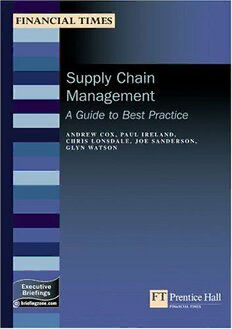
Supply Chain Management: A Guide To Best Practice (Management Briefings Executive Series) PDF
134 Pages·2003·0.688 MB·English
Most books are stored in the elastic cloud where traffic is expensive. For this reason, we have a limit on daily download.
Preview Supply Chain Management: A Guide To Best Practice (Management Briefings Executive Series)
Description:
In the last ten years, a revolution has occurred in the way in which companies manage their business strategy and its operational delivery. Called Supply Chain Management (SCM), it is a strategic business model that has been developed in response to increasing global competitive pressures. Many companies have already chosen to outsource all "non-essential" activities (transforming them from fixed to variable costs), to re-focus on their core competencies. And while this type of outsourcing plays well with investors in the short-term, the solution that it offers is only a temporary one - unless it is accompanied by a robust SCM strategy. This is because much of the value offered by companies to their customers is generated externally by the company's suppliers. So, if the company is unable to manage or develop its suppliers or if the suppliers fail to perform, the company's performance is affected too. Evidence suggests that for those firms who are prepared to develop SCM strategies, the payback in terms of competitive advantage and cost reduction can be considerable. In recent years, companies as diverse as IBM, Wal-Mart, Toyota and Dell have all undergone nothing short of a supply chain revolution and today, all regard supply chain management as an essential part of their overall business strategy. This briefing offers a practical working guide to help you and your organisation implement a robust and effective supply chain management approach. Extensive case study material illustrates what should -- and should not -- be done so that strategic and operational targets can be achieved. This briefing discusses the six key steps in effective SCM: * Focus on core competencies * Outsource all non-core competencies * Align demand and supply: consolidate all similar activities into category management * Rationalise the supply base and create strategic alliances with key suppliers * Develop long-term supply chain relationships and optimise through e-business technology * Undertake proactive supplier and supply chain development
See more
The list of books you might like
Most books are stored in the elastic cloud where traffic is expensive. For this reason, we have a limit on daily download.
